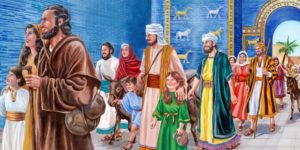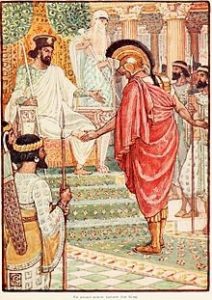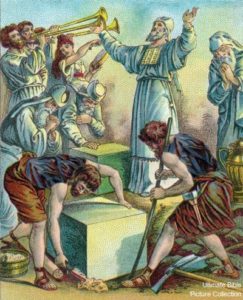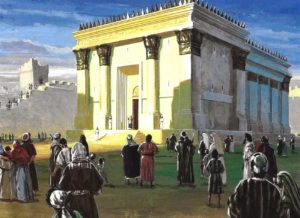TODAY’S READING FROM THE OLD TESTAMENT- EZRA 5:1-6:22
Cyrus gave the proclamation in the last verse of 2 Chronicles: “Let him go up” (2 Chronicles 36:23) –permitting every Jew to return to the Promised Land from their captivity in Median-Persian Empire. They were invited to go up to Jerusalem to rebuild the temple.
After Cyrus died, Persian officials (Rehum, Shimshai and others) questioned whether this great work was properly authorized. They sent a letter to Artaxerxes falsely accusing the Israeli remnant of rebellion. As a result, ‘the work came to a standstill’ until the second year of Darius, king of Persia (Ezra 4:24).
This historical situation of the temple-work coming to a standstill in the 6th century BC speaks to our present 21rst century work of the gospel. The enemy will do whatever he can to “bring the work to a standstill”. We are workers together with Christ, building up the body of Christ through our preaching, teaching, witnessing, edifying, and various expressions of sacrificial service that contribute towards the goal of making disciples of all nations. When we move forward in faith, we can expect a counterattack. Satan is a hinderer (1 Thessalonians 2:18). He is the accuser of the brethren (Revelation 12:10).
Satan may attempt to stop the work, but at best he only puts it on pause. The story is not over. God is greater. The prophets Haggai and Zechariah are sent to encourage Zerubbabel and Jeshua, son of Jozadak. Zechariah reminds Zerubbabel that the hindering mountain of difficulty and opposition will soon become a plain. God is in control.
Zechariah 4:6-7 6 Then he said to me (Zechariah), “This is the word of the LORD to Zerubbabel saying, ‘Not by might nor by power, but by My Spirit,’ says the LORD of hosts. 7 ‘What are you, O great mountain? Before Zerubbabel you will become a plain; and he will bring forth the top stone with shouts of “Grace, grace to it!”‘”
Apparently when the work stopped, people lost focus. They were no longer engaged in the godly endeavor of restoring the temple, and suffered for it. They became preoccupied with themselves and temporal matters.
Haggai would speak to their lapse into spiritual complacency, challenging them with God’s Word:
Haggai 1:8 8 “Go up to the mountains, bring wood and rebuild the temple, that I may be pleased with it and be glorified,” says the LORD.
Haggai 1:14 14 So the LORD stirred up the spirit of Zerubbabel the son of Shealtiel, governor of Judah, and the spirit of Joshua the son of Jehozadak, the high priest, and the spirit of all the remnant of the people; and they came and worked on the house of the LORD of hosts, their God,
We need the ministry of God’s Word to stir up the spirits of God’s servants, lest we fall into a spiritual malaise.
The success we read about in Ezra 5:2 is due to the ministry of God’s Word:
Ezra 5:2 2 then Zerubbabel the son of Shealtiel and Jeshua the son of Jozadak arose and began to rebuild the house of God which is in Jerusalem; and the prophets of God were with them supporting them.
There is no discharge from the spiritual battle during this age. The war wages until Christ returns. When adversaries are defeated in one battle, Satan raises up new opposition in another. This time the trouble comes from Tattenai, governor of Trans-Euphrates, someone who had no legal right to interfere. Yet he writes King Darius, implying that the building project is not authorized and is a threat to the Persian Empire.
Tattenai hears and records the reply of the Israeli remnant to those who questioned their actions. We can follow their example.
- Their confidence was fully placed in God. “We are servants of the God of heaven and earth.” (v.11a)
- They recognized and affirmed their godly heritage. “We are building a temple that was built many years ago.” (v.11b)
- They knew they were involved in a God-appointed work. The God of heaven is in charge. (v12)
- They acknowledged that their 70-year captivity was a result of their sin of forsaking their covenant responsibilities and relationship with God. Be willing to humbly admit failings and take responsibility. Failings do not equal failure. They can become ingredients to success, if we dignify the trials by trusting God for whatever will give Him the greatest glory.
- They appealed for a full search of the written evidence. They encouraged all to search out the facts for themselves. The Bereans were commended for such action (Acts 17:11).
Darius did find the scroll with the official record of the original permission granted by King Cyrus (Ezra 6:2-5).
King Darius orders Tattenai and Shethar-Bozenai and officials to mind their own business, back off, and no longer meddle or interfere with this work.
Ezra 6:6-7 6 “Now therefore, Tattenai, governor of the province beyond the River, Shethar-bozenai and your colleagues, the officials of the provinces beyond the River, keep away from there. 7 “Leave this work on the house of God alone; let the governor of the Jews and the elders of the Jews rebuild this house of God on its site.
Not only does Darius tell these intruders to leave Zerubbabel and the Temple project alone, but he tells them to financially support the work with the taxes from their provinces and sponsor the project by offering whatever is needed.
Darius ends his edict with a strong reminder that no one is to alter or tamper with the interpretation of its terms. If they do, a beam would be pulled from their home and used to construct a gallows for them to be hanged upon!
(Impaling criminals on gallows was the earlier Persian form of Roman crucifixion).
These governors carried out the decree with diligence (6:13).
How important is the ministry of preaching? (The Apostle Paul referred to this in yesterday’s reading in 1 Corinthians 1:21-2:9) Preaching saved the day for this returning remnant.
Ezra 6:14 14 And the elders of the Jews were successful in building through the prophesying of Haggai the prophet and Zechariah the son of Iddo. And they finished building according to the command of the God of Israel and the decree of Cyrus, Darius, and Artaxerxes king of Persia.
The temple was finished on the 12th month (Adar) of 515 BC, about 70 years after the Babylonians destroyed the temple of Solomon in 586. This was five and a half years after the prophets Haggai and Zechariah ministered their words of encouragement to call them back to work. The finished temple was celebrated with joy.
A month after the dedication, on the 14th day of Nisan, the correct day prescribed by the Law, all who had returned from the exile ate together THE Passover Lamb. The text has the ‘many people’ focusing on THE One Passover (Lamb).
The Jews demonstrated a gracious attitude extending their invitation to those who could not prove their Jewish lineage, but were willing to separate themselves from the unclean practices of their Gentile neighbors.
TODAY’S READING FROM THE NEW TESTAMENT – 1 CORINTHIANS 3:5-23;
Paul continues to communicate that the cross brings us onto the resurrection ground in which Christ is all in all. The resurrection ground is not personal preference or natural understanding. All is measured in the light of the work of the cross. Who is Paul? Who is Apollos? Paul was not crucified for them, only Christ. Apollos did not save them, only Christ. Paul and Apollos are part of this one new corporate humanity, the body of Christ. Each member has a unique ministry, but only as a portion in the communication of the Life of the Whole. Paul planted. Apollos watered. But God gave the growth. It is all God’s work and He is to get the glory. We are but servants who will be rewarded commensurate to the reality of Christ being the source and object of our works. That which is done for Him and through Him will stand the test, and be proved as having eternal value at the Bema Seat Judgment (silver, gold, and precious stone).
Paul reminds the Corinthians that they are God’s temple in Corinth! We cannot let the temple self-destruct by dividing into factions on petty issues of preference.
Pride comes in many forms, but Paul warns of the danger of spiritual pride, those who would boast of having ‘higher wisdom’ and ‘higher experiences’.
We should not divide because we favor one portion over another, for in Christ we have all!
1 Corinthians 3:21-23 21 So then let no one boast in men. For all things belong to you, 22 whether Paul or Apollos or Cephas or the world or life or death or things present or things to come; all things belong to you, 23 and you belong to Christ; and Christ belongs to God.
TODAY’S READING FROM THE BOOK OF PSALMS- PSALM 29:1-11
This is what we do when we give God-honoring praise- “Ascribe to the Lord the glory due His Name”. (Psalm 29:2)
Verses 1-2 of this Psalm eloquently call us to worship.
Verses 3- 9 remind us why we come to listen and not just praise. The voice of the Lord refers to the power of His Word when it is spoken.
Verses 10 and 11 remind us that the Lord is sovereign over ALL and that He is ready to supernaturally furnish His people with what they need. He gives strength and blesses His people with peace.
Do you know the Lord as the strength of your life? Have you been blessed with peace? (Romans 5:1)
TODAY’S READING FROM THE BOOK OF PROVERBS – PROV 20:26-27
Proverbs 20:26-27 26 A wise king winnows the wicked, and drives the threshing wheel over them. 27 The spirit of man is the lamp of the LORD, searching all the innermost parts of his being.
PRAY FOR THE NATIONS:
Kuwait
State of Kuwait
Asia
Geography
Area: 17,818 sq. km
An oil-rich wedge of desert between Iraq and Saudi Arabia at the northwest end of the Arabian Gulf.
Population: 3,050,744 Annual Growth: 2.47%
Capital: Kuwait
Urbanites: 98.4%
HDI Rank: 31 of 182 (UN Human Development Reports 2009)
Peoples
Peoples: 29 (38% unreached) All peoples
Unreached Peoples Prayer Card
Official language: Arabic Languages: 7 All languages
Religion
Largest Religion: Muslim
|
Religion |
|
Pop % |
Ann Gr |
|
420,698 |
13.79 |
5.7 |
|
|
46,391 |
1.5 |
7.3 |
|
|
Muslim |
2,490,627 |
81.64 |
|
Answer to Prayer
The underground Kuwaiti Church is gaining strength, numbers and maturity, and more converted Kuwaitis are making themselves known publicly. These latter believers are gathering for worship, teaching and prayer with boldness and open witness. While those who openly identify themselves as Christian are still a small minority, both this group and the much larger underground are growing rapidly.
Challenge for Prayer
Expatriate ethnic minorities. Part of Kuwait’s tolerance for other faiths is based on the reality that foreigners comprise most of the workforce. Few expatriates are permanent residents – most are men on short-term work contracts who must leave their families back home. Poor and unfair treatment of these laborers is all too common; this, combined with loneliness, opens many to sensitive Christian witness.
- a) Arab groups. Palestinians were the largest group in the past, but Palestine’s support for Iraq in the Gulf War resulted in discrimination against Palestinians and expulsion of many. Egyptians make up for the decrease in Palestinian numbers, as do Lebanese, Iraqis and many other Arab groups. There are many nominal Christians among them all – and many opportunities to minister the love of Christ.
- b) The Bidoon (literally “without”) are stateless Arabs originally from the Kuwait region, but now adrift in the Middle East. They are present in Kuwait in significant numbers. They have no known believers and almost no ministry to them.
- c) South Asians and Filipinos predominate, but there are also many Indonesians, Chinese and Koreans. They are largely contract laborers or domestic servants. A large number of Kuwaiti families leave much of the child raising to the maids and nannies who are often committed believers. Increasing numbers live and work in difficult circumstances, since they are considered beneath Arabs and there are no official channels handling the mistreatment and abuse that regularly occurs. Fortunately, the situation is beginning to improve through changes to the law. Pray for God to encourage the many believers and, through them, break into the lives of those from other faiths. Precisely because of their humble occupations, many of these Asians have amazing access to the homes and lives of Kuwaitis.
PRAYER: Thank you Lord for reminding us in Your Word that we are being built into a temple fit for Your dwelling. Unto You be glory in Your church both now and forevermore. We pray that we will prosper in the work of proclaiming Your Word and that through the many ministries of the body of Christ You would draw the lost to Your Son and build up the church which is His body. We are grateful for every servant of Yours, mindful that some plant, some water, but You, O God, give the increase. We pray that the illuminating power of the Holy Spirit will kindle the lamp of our spirits and give us fresh understanding through the Word today. In Jesus’ Name. Amen.
